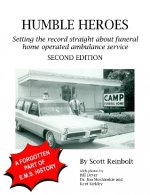In fact it sets the record straight about these businesses which were often unprofitable,
I largely concur, as I own the 1st edition. I do disagree with two points though:
1. It's my understanding that these funeral home owned/operated ambulance services weren't "often" unprofitable, but instead they were *(almost) ALWAYS* unprofitable. While they may have been able to pick up a quick removal and subsequent full suite of professional services in cases where the ambulance patient turned into a funeral home case, I'm guessing the conversion ratio from patient to "case" wasn't a top heavy one. In other words they may have just as easily gotten the funeral home case whether or not they also performed ambulance services before the patient died.
Instead, funeral homes performed ambulance services in addition to funeral home service because a. It had always been done that way thanks to the Pro car industry that made combination units available that could perform both services relatively easily, and b. they were performing what they considered to be a public service to the community, and (hopefully) generating goodwill.
I know there were likely exceptions to the rules, in cases like Vernon O'Neal in Dallas for example, a moderately sized funeral home business that picked up a lot of ambulance contracts throughout greater dallas and the surrounding metro area. O'Neal used both combo units and full ambulance units, including the full Dallas metro area ambulance contract (at least in November, 1963 when JFK was shot according to William Manchester's book "Death Of A President".
But as far as I know, there is currently no more than one Funeral Home in the entire USA still providing ambulance service.
Plus he discusses the reasons why -- over the years -- many funeral homes bowed out of providing ambulance service.
2. Not "many", but virtually *all*. Because it bled them money. Plus, most ambulance calls they billed out were left unpaid. And they and their staff would have to be available 24/7, 365 days a year for ambulance calls not to mention always having to keep buying new combo (or full ambulance) coaches, keep them stocked, fully maintained and ready, etc.
Scott's book does a great job pointing out these facts, and the sacrifices the funeral home industry made in those years performing ambulance services for their respective communities.




